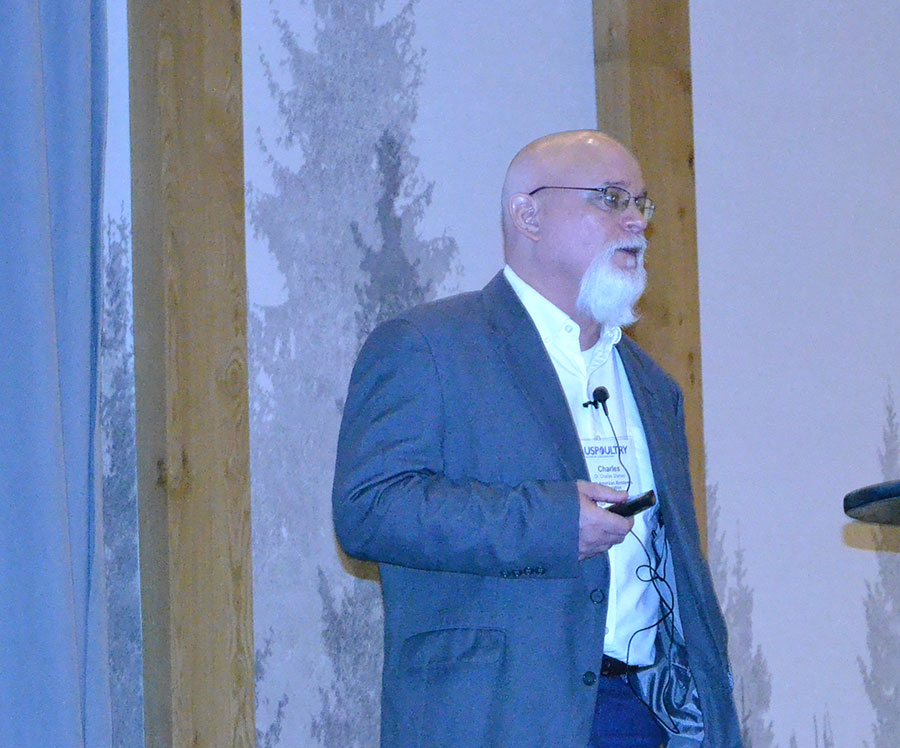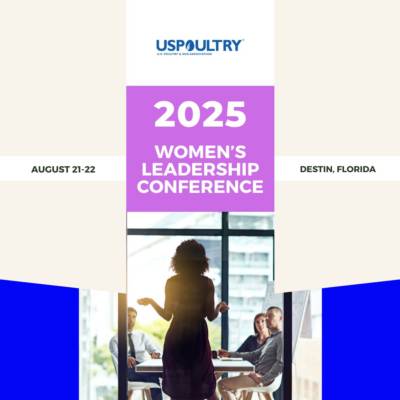- FOUNDATION
- |
- IPPE
- |
- PPFC
- |
- CONTACT
News Release
- Media Center Home /
- News Release View


For Immediate Release
U.S. Poultry & Egg Association
Tucker, Ga. - March 31, 2025
- Contact:
- Hannah Keck, 678.514.1979, hkeck@uspoultry.org, (USPOULTRY)
Biosecurity, Artificial Intelligence and Regulations Explored at USPOULTRY’s 2025 Feed Mill Management Seminar
Feed industry professionals recently gathered in Nashville, Tenn., for USPOULTRY’s 2025 Feed Mill Management Seminar. The program covered many topics, including regulatory updates, biosecurity, quality management and artificial intelligence (AI).
As part of his presentation on Feed Mill Biosecurity Protocols, Dr. Charles Starkey, vice president of scientific and regulatory affairs at the North American Renderers Association, discussed controlling microbial hazards like avian influenza, Newcastle disease, African Swine Fever and bacterial contamination in animal feeds. Key practices to assist with this include identifying microbial risks, restricting farm access, training employees, monitoring transportation and sanitation, maintaining an updated biosecurity plan and implementing pest control methods.
Gary Huddleston, director of feed manufacturing and regulatory affairs at the American Feed Industry Association, provided a regulatory update that highlighted the Food and Drug Administration’s (FDA) restructuring of its animal food ingredient approval processes. He also discussed mycotoxin regulation, ingredient testing and the effects of workforce reductions on ingredient reviews and state plans. Huddleston mentioned that fewer enforcement resources and more aggressive state plans could impact workplace safety and health regulations.
While discussing his presentation on Ingredient Quality at Receiving, Darrin Poole, manager of feed mill quality assurance at Wayne-Sanderson Farms, stressed the importance of receiving high-quality ingredients for optimal animal performance. With feed accounting for 70% of total expenditures, establishing proper protocols like clear ingredient specifications, sampling, inspection and testing is crucial. Poole emphasized that quality ingredients lead to better performance, while poor quality increases cost and reduces results.
Jamie Smith, sales territory manager with CPM, discussed the role of artificial intelligence (AI) in feed mills, highlighting its ability to automate processes, improve efficiency and worker safety and enhance production. AI benefits include machine learning for process improvement, predictive maintenance, data analytics for pattern recognition, and optimized scheduling. Challenges include high costs, large dataset needs and security concerns.
Ben Allen, CEO of BinSentry, continued the AI discussion, predicting that by 2026, AI will manage animal feed supply chains for major companies. He remarked that AI-driven systems will optimize feed consumption, ingredient orders and mill production schedules, enhancing operational efficiency. Allen believes early AI adopters will gain significant advantages while reducing costs and increasing profits. He commented, “Using technology to save up to 5% on feed costs translates directly to the bottom line for animal producers.”
###

Dr. Charles Starkey, vice president of scientific and regulatory affairs at the North American Renderers Association discusses feed mill biosecurity protocols.
More Recent News
July 3, 2025
USPOULTRY Financial Management Seminar Discusses Team Development, Economic Landscape and Cybersecurity Threats
The USPOULTRY Financial Management Seminar welcomed more than 150 poultry industry financial professionals in Amelia Island, Fla. A multidisciplinary slate of speakers delivered an impressive a...

July 2, 2025
USPOULTRY’s Women’s Leadership Conference to Focus on Professional Growth and Resiliency
Leadership, financial literacy, successful teams, good communication, health and wellness, and resiliency are all challenges that today’s working women face in their professional environment. USP...

July 1, 2025
Researchers Evaluate Branched-Chain Amino Acid Interaction on Layer Production and Performance
USPOULTRY and the USPOULTRY Foundation announce the completion of a funded research project from Mississippi State University on layer hen production and performance. Due to limited resources on th...
General Info
Events & Meetings
People & Groups
- Affiliated States
- Air Cargo Committee
- Hen Council
- Industry Partners
- Poultry Protein & Fat Council
- USPOULTRY Foundation
